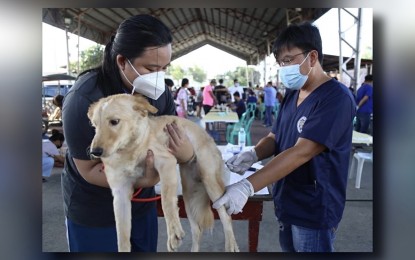
ANTI-RABIES VAX. A personnel of the Pangasinan Provincial Veterinary Office (PVO) inoculates with anti-rabies vaccine a pet dog during a veterinary medical mission in Calasiao town, Pangasinan in this undated photo. The Pangasinan Provincial Health Office is urging pet owners to have their pets vaccinated and for individuals bitten by animals to immediately get anti-rabies shots. (Photo courtesy of Province of Pangasinan)
MALASIQUI, Pangasinan – A health executive has encouraged Pangasinenses to get vaccinated once bitten by an animal after the province recorded three deaths from rabies from Jan. 1 to April 1 this year, up from two cases a year ago.
In a virtual forum hosted by the Philippine Information Agency-Pangasinan on Wednesday, provincial health officer Dr. Cielo Almoite said the victims failed to get an anti-rabies vaccine after they were bitten by the dogs, two of which are pets while the other one is a stray dog.
Almoite said the victims, aged 84, 11 and 63, respectively, are from Aguilar, Sison and Bayambang towns.
“Rabies is fatal. Once there is a symptom, death is inevitable,” she said in Filipino.
Almoite said anti-rabies vaccines are available for free in rural health units or health centers.
“Depending on their category, patients would be given up to four shots,” she said.
Almoite is also urging Pangasinenses to be responsible pet owners by having their pets vaccinated, noting that the Provincial Veterinary Office provides free anti-rabies vaccines.
Department of Health-Center for Health Development Ilocos Region director Paula Paz Sydiongco, during the same event, said the increase in the number of rabies cases presents an opportunity for pet owners to renew their commitment to responsible pet ownership.
“Ang problema sa rabies ay patuloy pa rin po na nagbibigay ng suliranin sa ating bansa. Kaya importante na magtulong-tulong po tayo, kasama ang mga lokal na pamahalaan upang pagtibayin ang programang anti-rabies gaya ng pagbibigay ng tamang impormasyon sa mga pet owners, pagbabakuna sa ating mga alagang aso at pusa (The problem with rabies in our country remains. It is important for us to unite, together with the local government unit, to strengthen anti-rabies programs by giving pet owners the right information, by having pet dogs and cats vaccinated), and to ensure that anti-rabies vaccines are accessible in all animal bite centers,” she added.
Rabies is a vaccine-preventable, zoonotic, viral disease affecting the central nervous system. (PNA)
